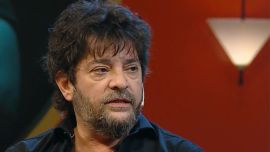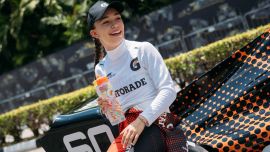THE WEEK IN CORONAVIRUS
The week ended with a total of 118,171 deaths and 7,694,506 confirmed cases at press time yesterday as against 117,901 deaths and 6,932,972 confirmed cases the previous Friday. The week started with the European Union taking Argentina (along with Australia and Canada) off its list of safe countries, where it had been since last October 29. On Wednesday Frente de Todos deputies Juan Carlos Alderete and Verónica Caliva presented a bill making vaccination compulsory for everybody aged over 18 but sources close to Health Minister Carla Vizzotti expressed misgivings about the idea. On Thursday President Alberto Fernández embarked on five days of voluntary isolation in Olivos presidential residence after being a close contact of more than one positive case of coronavirus, including Productive Development Minister Matías Kulfas. Infection numbers remain high, but Vizzotti stressed that numbers are “decreasing” at a press conference, at which she also confirmed a new vaccines deal with US laboratory Pfizer.
CAFIERO IN CAPITOL
Foreign Minister Santiago Cafiero met up with his United States counterpart, Secretary of State Antony Blinken in Washington on Tuesday. The host official professed his firm support for “a vibrant Argentine economy” with the two men agreeing on making Iranians suspected of terrorism personae non gratae in the region – an initiative triggered by the presence of Iranian vice-president Mohsen Rezaee (suspected of masterminding the 1994 terrorist bomb destruction of the AMIA Jewish community centre) at the recent inauguration of Nicaraguan President Daniel Ortega.
CRISTINA WRITES (AGAIN)
Vice-President Cristina Fernández de Kirchner on Tuesday posted a letter on the social networks claiming that the “Macri pandemic” had cost the country more than the Covid-19 pandemic.
EXTRAORDINARY SESSIONS
At the start of the week President Alberto Fernández announced that he had decided to call extraordinary sessions of Congress as from next Monday with an agenda yet to include the “Plan Plurianual” charting the economy for the next several years and an essential component of any agreement with the International Monetary Fund (IMF). Instead the main priority will be the reform of the Council of Magistrates, in response to the recent Supreme Court ruling declaring the 2006 legislation unconstitutional. The latest initiative seeks to split the difference between the current Council membership of 13 and the original number of 20 upheld by the Supreme Court, proposing a total of 17 members including more judges and lawyers (as against numbers of 20 and 14 in two opposition bills). The agenda also includes the 2022 Fiscal Consensus, signed by every provincial governor with only City Mayor Horacio Rodríguez Larreta holding out and permitting the creation of new provincial taxes.
BUDGET DEFICIT TRIMMED
Argentina sharply reduced its budget deficit in 2021 as the government tries to seal a new deal with the International Monetary Fund. The so-called primary deficit, which excludes interest payments, fell to three percent of gross domestic product from 6.5 percent in 2020. The figure, boosted by proceeds from a wealth tax, was also below the Economy Ministry’s estimate for a 3.5 percent gap. Economy Minister Martín Guzmán says he wants to eliminate primary fiscal deficits by 2027 as part of a deal to refinance about US$40 billion owed to the IMF. The Washington-based lender, meanwhile, says it needs to see an economic plan that lays out how that target would be met and how inflation and capital outflows would be reduced. The government expects a primary deficit of 3.3 percent this year, according to estimates in its proposed 2022 budget (which was rejected).
POVERTY LINE DEFINED
A family household of four persons needed a monthly income of 76,146.13 pesos to remain above the poverty line at the end of last year, 40 percent above the close of 2020 and thus well below the 2021 inflation figure of 50.9 percent, and a monthly income of 32,963.69 pesos not to fall into destitution (up by 45.3 percent from the end of 2020). Price freezes on basic products and static public service billing and transport fares helped to lower the increase. INDEC statistics bureau gave 40.6 percent of the population as lying below the poverty line the last time it was estimated in mid-2021.
MARKET WATCH
The “blue” parallel dollar closed at 219 pesos yesterday, strongly up from 210 pesos the previous Friday. The official exchange rate moved up from 108.75 pesos last Friday to 109.25 pesos yesterday, as quoted by Banco Nación, or 180 pesos if the 65 percent surcharges for savers are added. The parallel but legal exchange rates of the CCL (contado con liquidación) and MEP (medio electrónico de pagos) accompanied the upward trend of the “blue” with the former closing in a range of 221-224 pesos and the latter topping 215 pesos as against 209.37 and 201.17 pesos respectively the previous Friday. Country risk closed at 1,885 points at press time yesterday as against 1,863 points on January 13.
NISMAN REMEMBERED
The (DAIA) Jewish umbrella association last Monday marked the seventh anniversary of the death of AMIA prosecutor Alberto Nisman, affirming that the gunshot in his head ending his life was not suicide but murder while calling for full clarification of the case and demanding that justice be done. “I was with Alberto Nisman three days before his death. Alberto Nisman was not a suicide. Alberto Nisman was an enthusiastic investigator,” assured DAIA president Jorge Knoblovits. Nisman’s death on the eve of a denunciation of the Cristina Fernández de Kirchner government in Congress is being investigated as “homicide” by federal judge Julián Ercolini in proceedings upheld by the City Federal Appeals Court.
OFFICIALS MARK SIX YEARS OF SALA’S ARREST
Six years after the arrest of Milagro Sala, Kirchnerite governors, ministers, parliamentarians, political, trade union and social leaders, human rights activists, artists and intellectuals all teamed up last weekend to sign a paid ad to demand the release of the Tupac Amaru leader now serving house arrest in Jujuy. Among the signatories were Buenos Aires Province Governor Axel Kicillof, La Cámpora leader Máximo Kirchner, former vice-president Amado Boudou, 1980 Nobel Prize winner Adolfo Pérez Esquivel and 11 of the 20 ministers of the Frente de Todos administration. They called Sala’s “arbitrary and illegal” arrest “a laboratory for lawfare in Argentina,” deploring the “criminalisation of protest” and concluding: “There is no full democracy with political prisoners.” On Tuesday Sala was visited by Ministers Eduardo de Pedro (Interior) and Elizabeth Gómez Alcorta (Women, Gender and Diversity), the social activist’s former lawyer who called upon the Supreme Court to resolve her case. Opposition lawmakers strongly criticised the push, accusing the ministers of interfering with justice.
BAGMAN CLAIMS
Former Venezuelan chief Hugo “El Pollo” Carvajal, currently jailed in Madrid, last Monday gave more details of the illegal money deliveries in suitcases to centre-left and leftist politicians in Latin America and Europe, including the 2007 scandal of Venezuelan businessman Guido Antonini Wilson, who was caught smuggling US$800,000 into Argentina, allegedly to finance Cristina Kirchner’s presidential campaign. Carvajal stated that there had been 20 such flights previously, each delivering US$1 million without any problems.
HUMAN RIGHTS TRIALS
Four trials for crimes against humanity during the 1976-83 military dictatorship will be held next month in Bahía Blanca, San Juan, Santiago del Estero and Mar del Plata. A total of 24 verdicts were recorded for human rights trials in the course of 2021, sending at least 72 of the accused to prison.
JONES HUALA FREED
In late news yesterday Chilean courts freed Facundo Jones Huala, the leader of the Resistencia Ancestral Mapuche indigenous movement in Patagonia. Jones Huala was convicted in 2018 on charges of arson and the illegal possession of firearms, earning him a six-year jail term. He was arrested in Argentina in June 2017 after two years on the run.
LAMELA’S RABONA
Erik Lamela last Monday became the first Argentine footballer to win FIFA’s prestigious Puskas Prize for the best goal last year, a sensational and apparently spontaneous rabona kick scoring for Tottenham Hotspurs against their arch-rivals Arsenal in a Premier League match last March. The attacking midfielder was not present at the gala event in Zurich, receiving his prize virtually from Sevilla, his new team.


























Comments